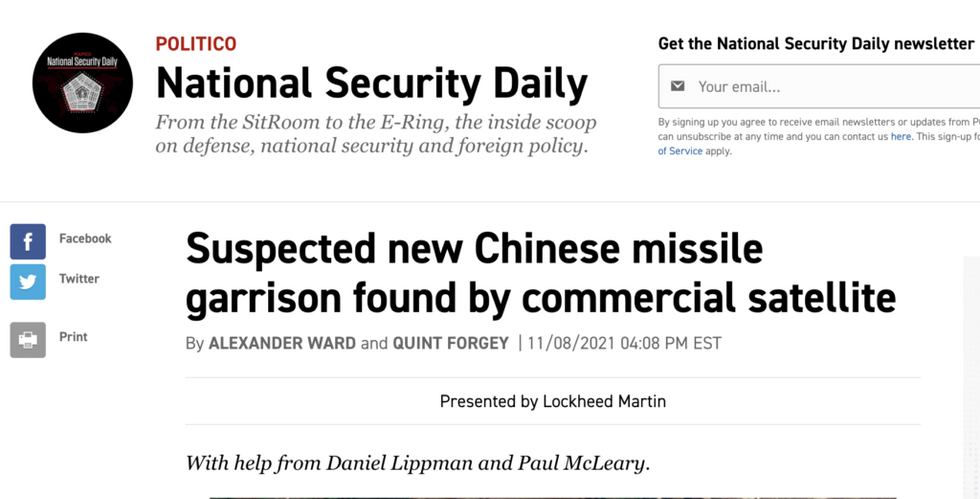Politico’s foreign policy newsletter National Security Daily on Monday published what appeared to be somewhat of a scoop: “Suspected new Chinese missile garrison found by commercial satellite,” the headline blared.
NatSec Daily had apparently combed through the Pentagon’s new report on China’s military and found "the existence of a new People’s Liberation Army Rocket Force (PLARF) bomber brigade stationed near the city of Xiangyang,” noting that it didn’t appear in last year’s report.
The newsletter then noted that an analysis by Janes, an open source intelligence firm, of commercially available satellite imagery taken on October 25 indeed shows that a new missile garrison was built in the area between 2019 and 2021. And according to the author of that report, the “unit assigned to the Xiangyang garrison is unknown, but the garrison may be intended to house 664 Brigade. 664 Brigade is a mobile intercontinental ballistic missile unit equipped with the DF-31AG and previously thought to be garrisoned at Yiyang.”
NatSec Daily then points to a report from the Federation of American Scientists from last December which said that the 664 Brigade had been stationed nearby.
But … that was it.
Politico’s big scoop essentially boiled down to: China built a base for a nuclear weapons brigade that we already knew about.
That may be interesting to a small group of people who follow the Chinese military’s comings and goings fairly closely. But why is such banal information being hyped as big news in mainstream media outlet?
NatSec Daily then tried to put the information about this new base in some kind of wider anti-American context, saying the “revelation” adds to news of “recently captured pictures of a fake U.S. aircraft carrier in the northwestern desert of China, which might be used by Beijing’s forces to practice battling the United States.”
It probably is being used by Beijing’s forces to practice battling the United States but how these two things are related at all is unclear.
But this sort of national security threat-inflation isn’t new for Politico. This summer, the outlet spent about a week following around some Iranian oil tankers — which Politico referred to as “warships” — that may or may not have been heading to Venezuela, making it seem like they were part of some grand naval armada coming to the Western Hemisphere to challenge American regional hegemony. (They actually ended up landing on the west coast of Africa.)
Oddly enough though, there actually is potentially alarming news about recent developments from the Chinese military — but that’s about recently discovered missile silos that are part of what experts believe is a nuclear modernization plan, not some new base to house a nuclear brigade that we already knew about.
FAS called it a “worrisome development” but the group didn’t hype the threat. Instead, FAS said that it’s “important to exercise caution” and the news “may ironically also create new opportunities for arms control discussions and potential agreements.”
Perhaps the FAS report didn’t hype these revelations because, unlike Politico, it isn’t funded by the defense industry. Indeed, NatSecDaily is brought to you by Lockheed Martin. And only those who build the bombs meant to be aimed at the Chinese could be happy with a headline like this:















